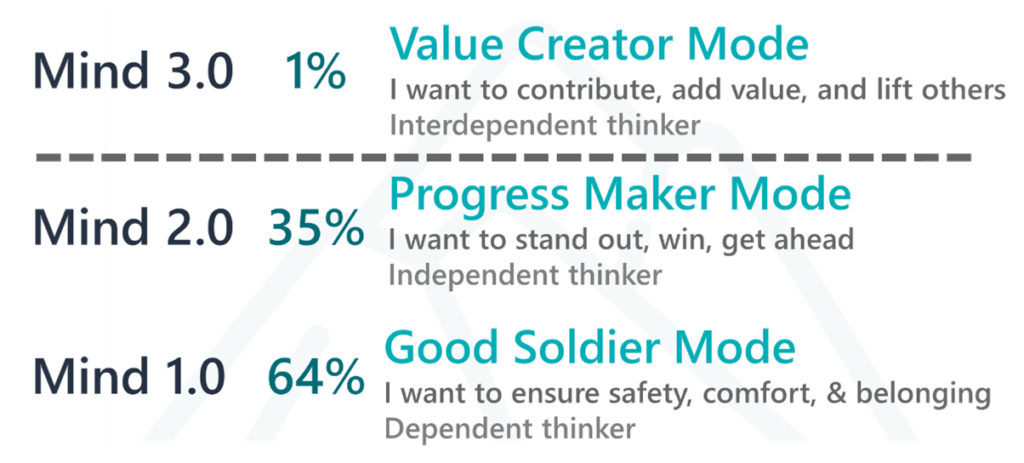There was a study of crew coaches (the rowing sport you have probably seen in the Olympics) that confirms several fundamental premises of vertical development:
- A leader’s vertical altitude dictates what they focus on and prioritize
- What feels right at one vertical altitude will feel wrong when we operate at a different vertical altitude
Specifically, in the study of crew coaches, what they found was that coaches at different levels of experience focus on (1) different amounts of things and (2) emphasize different things.
(Now before I share the differences, let’s agree on the fact that all crew coaches want to win and believe that what they are doing is what is best for their team.)
The results of the study were that:
- Novice coaches focus on dozens of things, but prioritize technique the most
- Intermediate coaches focus on about a dozen different things, but prioritize conditioning the most
- Expert coaches focus on only a handful of different things, but prioritize psychological factors the most
What do you think would happen if I went to novice or intermediate coaches and suggested that if they wanted to be more successful they needed to (1) focus on fewer things and (2) prioritize psychological factors?
They would likely reject this guidance, and think: “If I did that, I would be more likely to lose.” It would be a scary proposition for them. It is an approach that, to them, is unproven and doesn’t make much sense given their experience.
My Work with Executive Teams
If you have followed my work, you know that I focus on vertical development, and have developed a vertical development framework:

Leaders who operate at different levels are programmed to think and operate in different ways.
Every executive team that I have worked with has been comprised of nearly 100% Mind 1.0 and Mind 2.0 leaders.
And, when I work with these teams, I commonly encourage them to focus on the things that Mind 3.0 leaders (wired to create value) focus on. These commonly include:
- Culture (being gardener-minded leaders)
- Developing a clear, inspirational, and stakeholder-centric purpose
- Leading with an infinite mindset as opposed to a finite mindset
- Loosening their grip on outcomes (lagging indicators) and focus more on leading indicators (e.g., engagement, psychological safety)
- Creating space for failure
If the executive team is comprised of leaders who are wired for safety (Mind 1.0) or standing out (Mind 2.0), how do you think this goes over?
They generally look at me like I am a little crazy. And, they will say things like:
- “But if we focus on _____________ (e.g., culture), we probably won’t hit our annual goals.”
- “If we create space for failure, bad things will happen.”
- “If we spend time talking about and creating a purpose, we won’t get our work done, and therefore we won’t hit our results.”
They think they are right. But, they are not as right as they think they are.
They lack the vertical development (i.e., cognitive and emotional sophistication) to fully embrace the reality that the best leaders, the ones who have a huge positive impact, drive massive growth, and have long-term success prioritize things like culture, purpose, leading indicators, and removing the fear of failure from the organization (things they aren’t currently focused on).
Connecting the Dots
To go off of the crew coach study, here is what I find:
- Mind 1.0 leaders prioritize the status quo (the equivalent of “technique”)
- Mind 2.0 leaders prioritize results and outcomes (the equivalent of “conditioning,” as it is closely connected to wins)
Although these leaders are well-intended, they are not yet operating at a high level.
- Mind 3.0 leaders prioritize the things that influence psychological factors (i.e., culture, purpose, psychological safety, fear removal)
So, What Does this Mean?
The questions that arise for me are:
- How do we help an intermediate crew coach come to see that they will be more successful if they focus on fewer things and prioritize something different than they have been prioritizing?
- How do we help a Mind 2.0 leader come to see that they will be more successful if they focus less on outcomes and prioritize something different than they have been prioritizing?
I don’t think I have the silver bullet answer to these questions. But, here is what I do know: making a shift from prioritizing one thing to getting to a place where they prioritize a different thing requires reinvention.
When we look holistically at the difference between novice, intermediate, and expert coaches, we have got to believe that the expert coaches have reinvented themselves at least once, if not twice in their career.
The same could be said for Mind 3.0 leaders. To get there, they must have reinvented themselves at least twice.
When was the last time you reinvented yourself? When was the last time you changed your priorities? Are you in need of reinvention?
You are surely doing what you think is right. But, is it really what is best? Would the very best version of yourself say, “You have arrived. There is no longer any need for you to change. Your priorities are just as they should be.”?
In light of this:
- Should you actively be seeking reinvention?
- Are you actively seeking reinvention?
Next Steps
If you want to focus on reinventing and elevating yourself, here are some of my recommendations:
- Take my Personal Mindset Assessment to awaken to the quality of your mindsets
- Take my Vertical Development Assessment to awaken to the mind level you primarily operate from
- Read my new book: The Elevated Leader: Level Up Your Leadership Through Vertical Development
- Seek out a coach to help you vertically develop (I have limited spots available)
- Work with a trauma therapist (I have been doing this for the last two years, and it has been eye-opening, life-changing, and mind/body/heart-healing)










